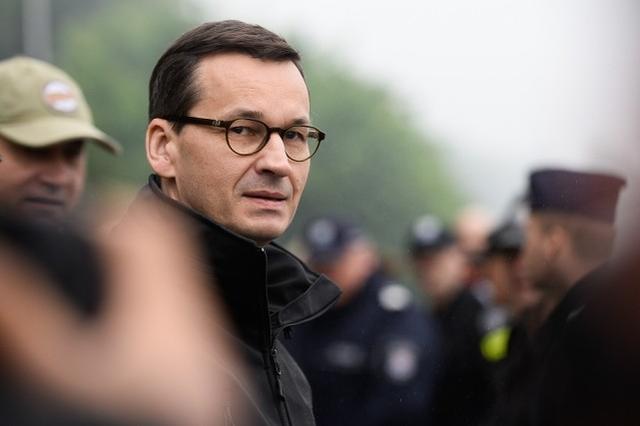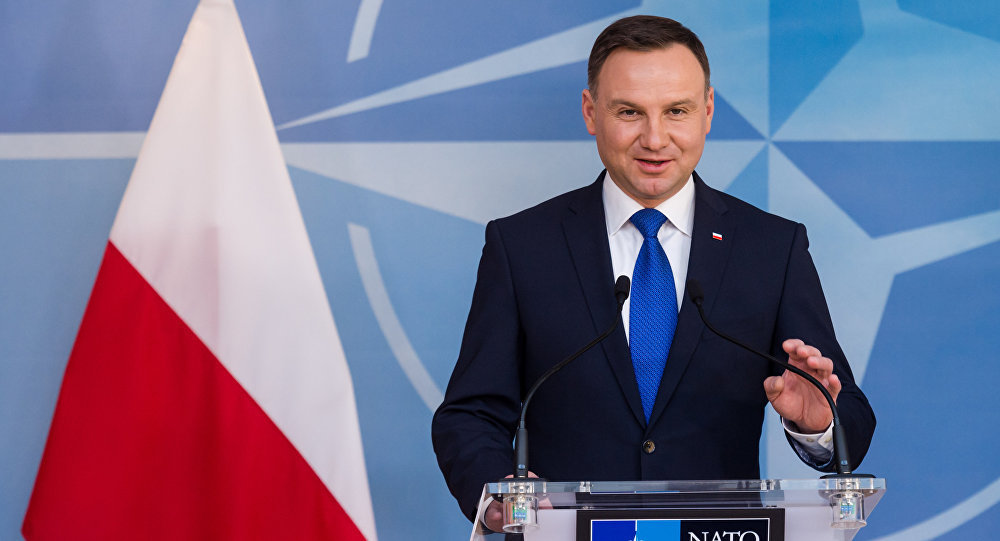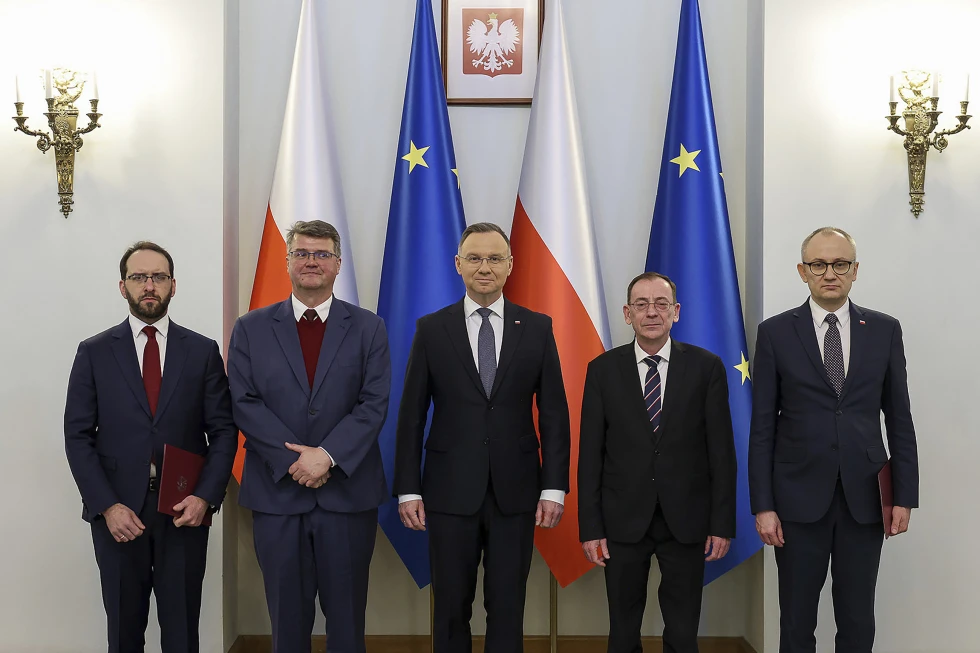The recent events in Poland have brought to the forefront a contentious issue at the intersection of politics and justice.
President Andrzej Duda’s decision to pardon two politicians, who were embroiled in a standoff between the current centrist government and the previous conservative administration, has sparked a nationwide debate.
This essay aims to delve into the complexities of this situation, examining the implications of presidential pardons, the role of the justice system, and the impact on Polish society.
The political landscape in Poland has been characterized by a significant shift in power dynamics. The transition from a right-wing government to a centrist administration has led to a palpable tension and polarization within the country.
President Duda’s alignment with the Law and Justice party, which previously held power, adds a layer of complexity to his recent pardoning decision.
The intertwining of political affiliations and the justice system raises pertinent questions about the autonomy and impartiality of legal proceedings.
Presidential pardons are a vital component of the executive branch’s authority, allowing the head of state to grant clemency or reprieve to individuals convicted of crimes.
While the power to pardon is intended to serve as a mechanism for mercy and fairness, its application in politically charged scenarios can lead to skepticism and controversy.
In the case of Poland, President Duda’s decision to pardon the two senior opposition members, who were aligned with the previous government, has ignited concerns about the potential misuse of executive authority for partisan purposes.
The independence and integrity of the justice system are fundamental pillars of any democratic society. The refusal of the new justice minister to initiate a pardon procedure, followed by President Duda’s direct appeal to release the imprisoned politicians, underscores the intricate relationship between political influence and legal processes.
This sequence of events has raised alarms about the susceptibility of the justice system to external pressures and the potential erosion of its impartiality.
The ripple effects of these developments extend beyond the realm of politics and law, permeating into the fabric of Polish society.
President Duda’s rationale for the pardons, citing concern for the health of the imprisoned politicians and acknowledging the sentiment of a segment of Polish society aligned with Law and Justice, reflects the broader societal divisions and divergent viewpoints within the country.
The release of the politicians to the embrace of their families and cheering supporters serves as a poignant symbol of the emotive undercurrents shaping public sentiment.
The confluence of politics and justice in the context of President Duda’s pardons illuminates the intricate interplay between power, law, and public perception.
The ramifications of these actions reverberate across the legal, political, and social spheres, prompting introspection and discourse.
As Poland navigates through this juncture, it is imperative to uphold the principles of an impartial justice system, safeguarding its autonomy from undue influence.
The ongoing dialogue surrounding these pardons underscores the need for transparency, accountability, and the preservation of democratic values in the pursuit of a just society.
The recent events surrounding the pardoning of two inmates by President Duda have sparked a heated debate among legal experts and government officials.
The situation has raised questions about the effectiveness of the 2015 pardon and has led to a standoff between the President and the Minister of Justice.
In 2015, President Duda had pardoned the two inmates, but he had previously stated that he could not do so again.
However, in response to the inmates’ situation and the government’s refusal to release them, President Duda announced on Tuesday that he was considering pardoning them once again.
This decision has been met with mixed reactions and has reignited the debate over the legality of the 2015 pardon.
Legal experts have argued that the 2015 pardon was ineffective because it was granted before the final appeal in the inmates’ case was heard and the court procedure completed.
This has raised concerns about the validity of the pardon and has called into question the President’s authority to grant pardons in such cases.
The situation has been further complicated by the arrest of two senior Law and Justice party members, former Interior Minister Mariusz Kamiński and his former deputy, Maciej Wąsik.
Both were imprisoned separately and have since gone on a hunger strike. There have been reports of Kamiński being examined at a hospital, adding to the urgency of the situation.
In response to the arrest of the two party members, President Duda sent a motion to Bodnar, the Minister of Justice, asking for their pardon and release.
However, the Minister rejected the request, emphasizing that his decision was not binding for President Duda and suggesting that the President had the authority to declare the two “pardoned.”
The standoff between President Duda and the Minister of Justice has highlighted the complexities of the pardoning process and has raised questions about the separation of powers within the government.
It has also drawn attention to the need for clear guidelines and procedures for granting pardons in order to avoid confusion and legal disputes.

In conclusion, the recent events surrounding the pardoning of the two inmates by President Duda have brought to light the challenges and complexities of the pardoning process.
The debate over the legality of the 2015 pardon and the standoff between the President and the Minister of Justice have underscored the need for clarity and transparency in the pardoning process.
It is crucial that the government addresses these issues and establishes clear guidelines to ensure that the pardoning process is conducted in a fair and lawful manner.
The case of Kamiński and Wąsik has sparked widespread debate and controversy in Poland, with many questioning the actions of both the individuals involved and the political leaders who have intervened in the legal process.
The conviction of abuse of power and forging documents, dating back to actions taken in 2007 during their tenure in a previous Law and Justice-led government, has raised serious concerns about the rule of law and the integrity of the country’s judicial system.
Critics have pointed to President Duda’s pardon of Kamiński and Wąsik in 2015 as a clear example of his disregard for the legal process and his willingness to act in the interests of the Law and Justice party.
The decision to pardon individuals who had been convicted of such serious offenses has raised questions about the independence of the judiciary and the potential for political interference in legal matters.
The situation took a dramatic turn in June when Poland’s Supreme Court overturned the pardons and ordered a retrial of the case.
This decision was seen as a significant victory for the rule of law and a clear indication that the judiciary was not willing to bow to political pressure.
The subsequent retrial resulted in the re-conviction of Kamiński and Wąsik, who were then sentenced to two years in prison.
The events that followed the sentencing added another layer of complexity to the case. Police arrested Kamiński and Wąsik while they were at President Duda’s presidential palace, leading to speculation that they were seeking protection from the highest office in the land.
This development further fueled the debate about the relationship between the executive and the judiciary, and raised concerns about the potential for political favoritism to influence legal proceedings.
The case of Kamiński and Wąsik has become a symbol of the broader tensions within Polish society, as well as a focal point for the ongoing struggle between different branches of government.
It has also highlighted the challenges facing the country as it seeks to uphold the rule of law and maintain the independence of its judiciary in the face of political pressure.
In conclusion, the case of Kamiński and Wąsik has raised important questions about the integrity of Poland’s legal system and the potential for political interference in legal matters.
The actions of President Duda in pardoning the individuals involved, as well as the subsequent overturning of the pardons by the Supreme Court, have brought these issues to the forefront of public debate.
The events that followed, including the re-conviction of Kamiński and Wąsik and their arrest at the presidential palace, have further underscored the complex and contentious nature of the case.
As Poland continues to grapple with these issues, it is clear that the outcome of this case will have far-reaching implications for the country’s democratic institutions and the rule of law.
The case of Kamiński and Wąsik has indeed sparked widespread debate and controversy in Poland, and it has raised serious concerns about the rule of law and the integrity of the country’s judicial system.
The conviction of abuse of power and forging documents, dating back to actions taken in 2007 during their tenure in a previous Law and Justice-led government, has led many to question the actions of both the individuals involved and the political leaders who have intervened in the legal process.
President Duda’s pardon of Kamiński and Wąsik in 2015 has been seen as a clear example of his disregard for the legal process and his willingness to act in the interests of the Law and Justice party.
The decision to pardon individuals who had been convicted of such serious offenses has raised questions about the independence of the judiciary and the potential for political interference in legal matters.
The recent decision by Poland’s Supreme Court to overturn the pardons and order a retrial of the case was a significant victory for the rule of law.
It demonstrated that the judiciary was not willing to bow to political pressure. The subsequent retrial resulted in the re-conviction of Kamiński and Wąsik, who were then sentenced to two years in prison.
The events that followed the sentencing, including the arrest of Kamiński and Wąsik at President Duda’s presidential palace, have added another layer of complexity to the case.
This has fueled the debate about the relationship between the executive and the judiciary, and raised concerns about the potential for political favoritism to influence legal proceedings.
The case of Kamiński and Wąsik has become a symbol of the broader tensions within Polish society and a focal point for the ongoing struggle between different branches of government.
It has also highlighted the challenges facing the country as it seeks to uphold the rule of law and maintain the independence of its judiciary in the face of political pressure.
In conclusion, the case of Kamiński and Wąsik has raised important questions about the integrity of Poland’s legal system and the potential for political interference in legal matters.
The actions of President Duda in pardoning the individuals involved, as well as the subsequent overturning of the pardons by the Supreme Court, have brought these issues to the forefront of public debate.

The events that followed, including the re-conviction of Kamiński and Wąsik and their arrest at the presidential palace, have further underscored the complex and contentious nature of the case.
As Poland continues to grapple with these issues, it is clear that the outcome of this case will have far-reaching implications for the country’s democratic institutions and the rule of law.

